
Image Source: Google
When it comes to cervical cancer treatment and care, it is crucial for women to be empowered with the knowledge and information they need to make informed decisions. From diagnosis to treatment options and supportive care, navigating the journey of cervical cancer can be overwhelming. You can also contact Jacaranda Maternity if you need more information about cervical cancer treatment.
Early Detection and Diagnosis
Early detection of cervical cancer significantly increases the chances of successful treatment. Regular screenings such as Pap smears and HPV tests are essential for detecting any abnormalities in the cervix. If an abnormality is detected, further diagnostic tests may be recommended, including:
Diagnostic Procedures
- Colposcopy: A procedure that allows the doctor to examine the cervix closely using a magnifying instrument called a colposcope.
- Biopsy: During a colposcopy, if any abnormal areas are identified, a small tissue sample (biopsy) may be taken for further analysis.
- Imaging tests: In some cases, imaging tests such as MRI or CT scans may be used to determine the extent of the cancer.
Treatment Options
Once a diagnosis of cervical cancer is confirmed, the next step is to discuss treatment options with your healthcare team. The choice of treatment will depend on various factors, including the stage of the cancer, your overall health, and personal preferences. The main treatment options for cervical cancer include:
Surgery
- Conization: A surgery to remove a cone-shaped piece of tissue from the cervix.
- Radical hysterectomy: Surgery to remove the uterus, cervix.
- Pelvic exenteration: In cases of advanced cervical cancer, this surgery may be recommended to remove the uterus, cervix, ovaries, and nearby lymph nodes.
Radiation Therapy
- External beam radiation: High-energy beams are directed at the cancer site from outside the body.
- Brachytherapy: Radioactive material is placed inside the body, near the cancer site.
Chemotherapy
- Chemotherapy drugs may be used alone or in combination with radiation therapy to treat cervical cancer.
- Targeted therapy: This type of treatment targets specific molecules involved in cancer cell growth.
Supportive Care and Well-being
Managing cervical cancer goes beyond medical treatments and procedures. It is essential for women to take care of their overall well-being and seek support throughout the journey. Here are some tips for supportive care:
Emotional Support
- Join a support group: Connecting with others who are going through a similar experience can provide emotional support and encouragement.
- Talk to a counselor: A mental health professional can help you navigate the emotional challenges of dealing with cancer.
Healthy Lifestyle Choices
- Eat a balanced diet: Nutritious foods can help support your immune system and overall health.
- Stay active: Regular exercise can boost your energy levels and improve your mood.
- Get enough rest: Adequate sleep is crucial for your body to heal and recharge.
Alternative Therapies
- Acupuncture: Some women find relief from cancer treatment side effects through acupuncture.
- Massage therapy: Gentle massages can help reduce stress and promote relaxation.
Follow-up Care and Monitoring
After completing treatment for cervical cancer, regular follow-up care is essential to monitor your health and detect any signs of recurrence. Your healthcare team will recommend a follow-up schedule that may include:
Physical Exams
- Regular pelvic exams to check for any signs of cancer recurrence.
- Imaging tests: Periodic imaging tests may be recommended to monitor your recovery.
HPV Testing
- Regular HPV tests to check for the presence of the virus that can cause cervical cancer.
By staying informed and actively participating in your care, you can empower yourself to make the best decisions for your health and well-being. Remember that you are not alone in this journey, and there are resources and support available to help you navigate through the challenges of cervical cancer treatment and care.
